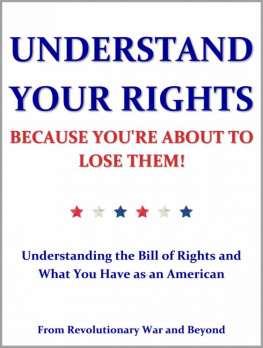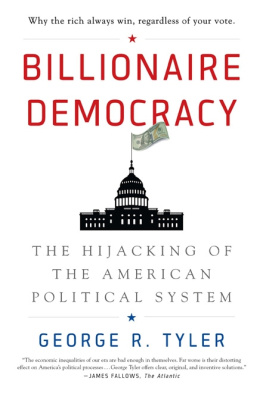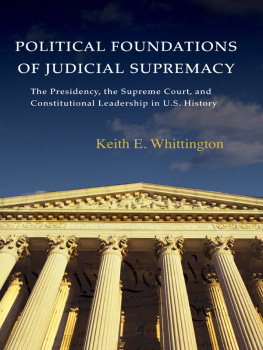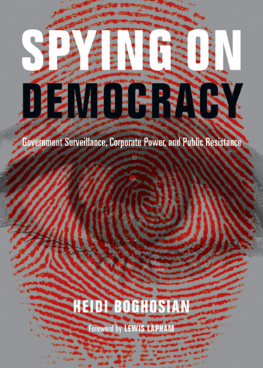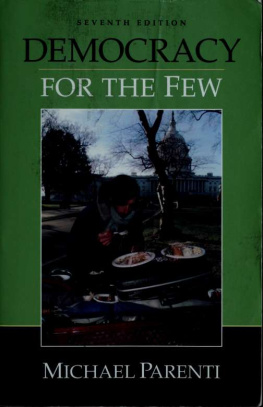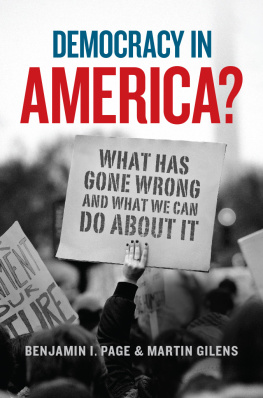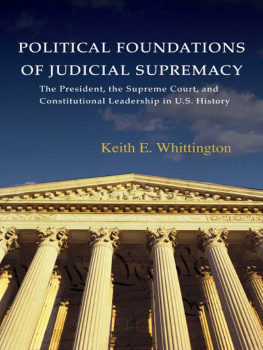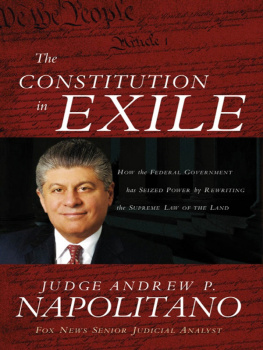Thank you for downloading this Simon & Schuster ebook.
Get a FREE ebook when you join our mailing list. Plus, get updates on new releases, deals, recommended reads, and more from Simon & Schuster. Click below to sign up and see terms and conditions.
CLICK HERE TO SIGN UP
Already a subscriber? Provide your email again so we can register this ebook and send you more of what you like to read. You will continue to receive exclusive offers in your inbox.
CONTENTS
DEDICATION
For the women and men who give their lives to public service in the nations capital and in the states, cities, counties, and towns across America.
Throughout legislatures, executive offices, and courts, dedicated public servants devote their talent and energy to designing laws that serve all the people, executing those laws with competence and compassion, and adjudicating cases with justice and mercy. I have been privileged to work alongside thousands of them, and there is no one with whom Id rather pass, execute, adjudicate, or debate about a law or program than a committed public servant.
JAC Jr.
INTRODUCTION
Our democracy is damaged.
We all know it. Every measure of our people reveals their perilously low confidence in the potential of the presidency, Congress, and the courts to stem the damage to our democracy and repair it.
But we can do it. First we must recognize that while we do have foreign enemies and adversaries, the greatest threats to our way of life come from within our nation. We must also understand how these forces exacerbate the worst and most destructive aspects of each other.
In his Study of History , British historian Arnold Toynbee reminded the world that civilization is not a condition but a movement, a voyage, not a harbor. He concluded that the great civilizations were destroyed by self-inflicted wounds, not by enemies from without, but from within. As he put it, In all cases reviewed the most that an alien enemy has achieved has been to give an expiring suicide her coup de grace.
Our nation confronts the fierce foreign winds of ISIS, chaos in the Middle East, Russian hacking and meddling efforts to discredit our democratic system, and an ambitious and aggressive China. We face an unraveling European Union and globalization fired up by an unprecedented technological revolution. There are nuclear weapons in the hands of North Korea and perhaps Iran, proliferating beyond our control. Extremists and enemies are capable of terrorism not only with guns and bombs, but also with biological, chemical, and electronic weapons.
These are serious threats to our nation and way of life. But the most menacing lesson of historyone we may repeat if we refuse to learn from itis that the greatest danger to our democracy is from within, not from without.
You dont need a high school diploma to know that Washington isnt working. Nor do you need a course in history to understand that America today is a far cry from the America of a generation or two ago, much less the adventurous, heroic, and determined population of the thirteen colonies that founded this nation. Our leaders find it much harder to get government to work, to devise and deliver public policy that helps all our people, and to muster solid majorities of Americans behind it. Its become a backbreaking lift to establish and nourish an economic and social environment that helps parents raise their children. We live in a savagely raw political culture. This is an era of double-edged swords like the technological and social media revolution that may be as much a challenge as a boon to our democratic way of life.
Only we the people can repair our damaged democracy. We must understand the various vexing challenges our nation faces and how they affect one another in order to confront and conquer them. This book reveals how and why our democracy is damaged and makes some suggestions for renovation. This nation is yours and mine. We have the opportunity and the responsibility to repair and renew it. I have long believed that once our people fully grasp the problems, they fix them. Thats why I wrote this book.
The dysfunction we see today in Washington is not something spontaneous that just happened. Nor is it the fault of one party or one branch of government. Nor of any one president, Congress, or Supreme Court. The damage to our democracy has been accumulating for many years. Any one of us who has exercised power in the world of Washington over the past several decades almost surely has some fingerprints on it.
We face a disproportionately powerful presidency, a gridlocked and distracted Congress, politicized courts, dependent states, and a big-bucks-shaped public policy. At the same time, media, economic, educational, cultural, political, racial, and religious fault lines fragment our society. My concern is that people see these as isolated problems. They are not. This book shows how they reinforce and aggravate the worst elements in each other. The incestuous and corrosive combination of these problems is a far greater danger to our democracy than the sum of their individual parts. It has diminished the ability of our public institutions and leaders to protect and enrich our inalienable right to life, liberty, and the pursuit of happiness.
In Washington the three branches of government have lost their constitutional bearings. Much of their capacity to provide coherent and unifying leadership that serves all our people and maintains our leading role in the free world has been lost.
There is a colossal concentration of power in the American presidency with its palace guard of hundreds of professionals who answer only to the president. Concentration of power in one person or one branch of government amid fragmentation almost everywhere else is a recipe for damaging democracy.
Congress is crippled by a take-no-prisoners partisanship. The House and Senate are pushed and shoved around by all sorts of well-financed commercial, cultural, and single-issue special interests that call compromise a sellout.
The Supreme Court and many lower federal courts are riven by conservative versus liberal politics. This rift begins with politically charged litmus tests that dominate the presidential nomination and Senate confirmation processes. It widens with the blistering rhetoric in so many of the top courts 54 decisions and the politically infused rulings of many district court judges.
A malfunctioning Congress enhances the power of the president. The partisanship that dominates Congress and its confirmation process undermines respect for the Supreme Court. For an increasingly powerful executive branch, the checks, balances, and separation of powers designed to protect our freedom can become lines in the sand that are easily breezed away.
As the fifty states grow more dependent on federal funding, they more readily bow to the mandates that accompany those dollars. They need the money to provide education, health care, affordable housing, and infrastructure renewal for their residents. This dependency is atrophying their political muscles. It suppresses their potential as laboratories for creative public policies and more efficient ways to deliver essential services.
The many millions of dollarsbillions for wannabe presidentsrequired to achieve elective office trample the constitutional concept of one person, one vote. Those with enormous fortunes use their deep pockets to dictate federal, state, and local public policies. High rollers with fat bankrolls move from federal to state government, from Congress to state legislatures, from courts and local prosecutors to city councils and town halls, until they get their way. The demeaning conduct often required to raise political money affects the quality of the individuals willing to enter public life.
Next page

